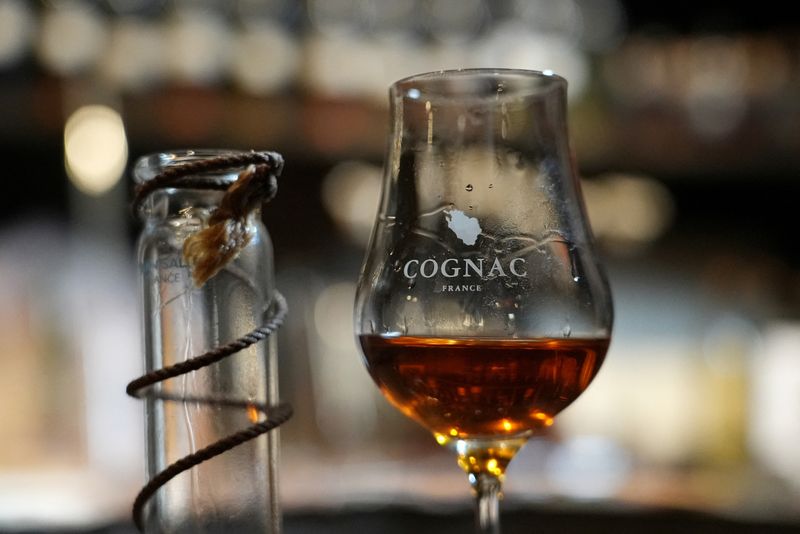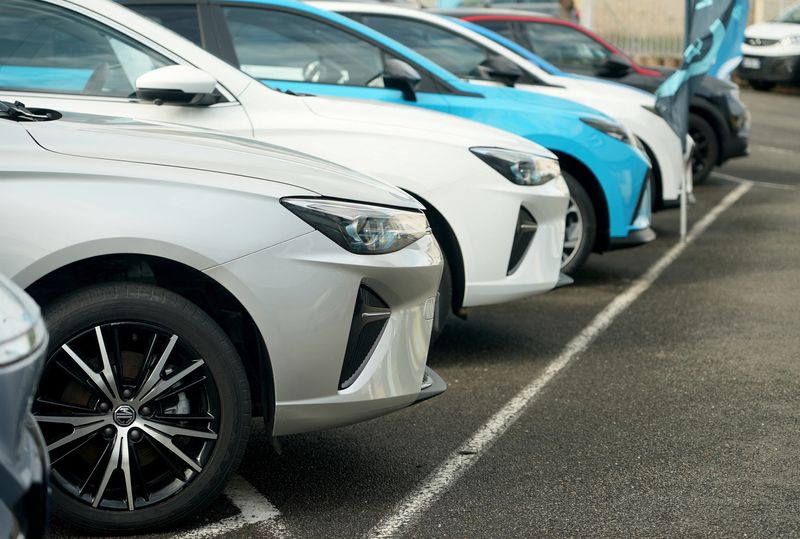By Sybille de La Hamaide
COGNAC, France (Reuters) -In this grape-growing region of western France, where brandy producers are fretting over the fallout from a trade dispute between the European Union and China, Christophe Bouetard is more worried than most.
Bouetard runs the MG Motor dealership in Cognac, making his living off selling Chinese-made electric vehicles (EVs) that will soon face hefty EU tariffs of 45%. But many of his customers work in the local brandy trade, which China is now targeting with retaliatory anti-dumping measures.
Bouetard, 56, described the double hit he faces as tricky. Chinese-made EVs account for roughly half of his sales.
"We're caught in a vice, between the Cognac region and the image of our Chinese vehicles, which are now in conflict because of these European tariffs," he said.
A gloom hangs over Cognac, a small town that has given its name to France's most famous brandy.
The sector was on a decade-long tear until soaring inflation thumped foreign sales. Cognac exports fell over a fifth in 2023, and this year's harvest was already threatened by disease and poor weather before Beijing announced its provisional tit-for-tat measures against the region's top tipple.
France was seen as the target of Beijing's brandy probe due to its support of tariffs on Chinese-made EVs. French brandy shipments to China reached 1.7 billion euros ($1.85 billion) last year, bringing revenue of 1 billion euros to Cognac producers.
France's trade ministry has said Beijing's brandy measures violate free trade. The European Commission plans to challenge the move at the World Trade Organization.
"It is not a question of engaging in a trade war with China, with which we have significant trade, but of re-establishing the conditions for fair competition," Trade Minister Sophie Primas told Reuters.
FRANCE'S LUXURY SECTOR FEELS THE HEAT
But despite the fighting words from Paris, many cognac producers fear the industry will be sacrificed by Brussels and the French government to ring-fence Europe's much larger car industry from cheap Chinese-made EVs.
One senior Cognac official, speaking on condition of anonymity, told Reuters the sector doubted definitive tariffs could be avoided. In meetings with senior government officials from the president and prime minister's offices, they had failed to hint at any potential solution, he said.
Beijing's brandy measures have rippled across France's luxury sector, which is already struggling with weaker Chinese demand. Shares of LVMH, Remy Cointreau and Pernod Ricard (EPA:PERP), which market the high-end Hennessy, Remy Martin and Martell cognac respectively, fell sharply on Tuesday after Beijing announced the measures.
Former French Prime Minister Jean-Pierre Raffarin was France's special representative to China until 2022, and still represents President Emmanuel Macron in China for some events. He doubted China, which also has an ongoing anti-dumping and anti-subsidy investigation into EU pork products, would target French luxury products next.
"Luxury is a sector in which the determining factor is often the Chinese clientele itself," he said.
Nonetheless, Marc Fesneau, France's former agriculture minister, said it was clear China was aiming at France.
"This is a European measure that only has consequences for a single sector: cognac," he told Reuters. "Cognac is France, so we can see China's diplomatic game."
TOUGH NEW MEASURES
From Friday, importers of brandy originating in the European Union will have to put down security deposits from 34.8% to 39.0% of the import value, according to temporary measures announced by China's commerce ministry this week.
Should those measures become permanent, the additional duties would lead to a slump in exports to China, cognac's second-largest market after the United States, France's Bureau National Interprofessionnel du Cognac trade body said.
Emmanuel Painturaud, who owns the 90-year-old Painturaud Frères Cognac house with his three brothers, said Beijing's response was particularly worrying as Chinese consumers tend to buy the oldest and most expensive cognacs.
"Wine makers feel like they're being held hostage, with some vindictive moves by the Chinese government," he told Reuters in his cellar, lined with wooden barrels full of cognac.
Nearly all of Cognac's output is exported. Historically, wine was distilled so that it would take less room on ships. From Cognac, those ships whisked it down the Charentes river to faraway destinations, including China, where it has been sold for over 250 years, producers said.
Anthony Brun, the chairman of the general union of Cognac winegrowers UGVC, told Reuters that the outlook for the industry had been bleak even before China announced its measures.
"If, on top of that, we add the loss of our second market, the consequences will be catastrophic," he said.
Bouetard, the MG dealer, was trying to stay optimistic, despite the fact that his sales had already fallen more than a quarter since France began rolling back incentives to buy EVs, and particularly those from China.
He said MG could lean more heavily on its hybrid vehicles to avoid tariffs, and expected Chinese carmakers to build factories in Europe to sidestep punitive measures. But he admitted next year could be tough.

If the 45% tariffs become a permanent reality, he said, "we're going to have to find solutions."
($1 = 0.9166 euros)
(Additonal reporting by Lucien Libert, Elizabeth Pineau, Florence Loève and Michel Rose;Editing by Gabriel Stargardter and Emelia Sithole-Matarise)
